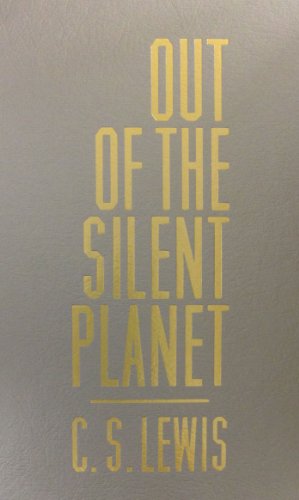Items related to Out of the Silent Planet

Synopsis
Written during the dark hours immediately before and during the Second World War, C. S. Lewis's Space Trilogy, of which Out of the Silent Planet is the first volume, stands alongside such works as Albert Camus's The Plague and George Orwell's 1984 as a timely parable that has become timeless, beloved by succeeding generations as much for the sheer wonder of its storytelling as for the significance of the moral concerns. For the trilogy's central figure, C. S. Lewis created perhaps the most memorable character of his career, the brilliant, clear-eyed, and fiercely brave philologist Dr. Elwin Ransom. Appropriately, Lewis modeled Dr. Ransom after his dear friend J. R. R. Tolkien, for in the scope of its imaginative achievement and the totality of its vision of not one but two imaginary worlds, the Space Trilogy is rivaled in this century only by Tolkien's trilogy The Lord of the Rings. Readers who fall in love with Lewis's fantasy series The Chronicles of Namia as children unfailingly cherish his Space Trilogy as adults; it, too, brings to life strange and magical realms in which epic battles are fought between the forces of light and those of darkness. But in the many layers of its allegory, and the sophistication and piercing brilliance of its insights into the human condition, it occupies a place among the English language's most extraordinary works for any age, and for all time.
Out of the Silent Planet introduces Dr. Ransom and chronicles his abduction by a megalomaniacal physicist and his accomplice via space ship to the planet Malacandra. The two men are in need of a human sacrifice and Dr. Ransom would seem to fit the bill. Dr. Ransom escapes upon landing, though, and goes on the run, a stranger in a land that, like Jonathan Swift's Lilliput, is enchanting in its difference from Earth and instructive in its similarity.
"synopsis" may belong to another edition of this title.
Review
"Los Angeles Times"
Lewis, perhaps more than any other twentieth-century writer, forced those who listened to him and read his works to come to terms with their own philosophical presuppositions.
"The New Yorker"
If wit and wisdom, style and scholarship are requisites to passage through the pearly gates, Mr. Lewis will be among the angels.
"Los Angeles Times" Lewis, perhaps more than any other twentieth-century writer, forced those who listened to him and read his works to come to terms with their own philosophical presuppositions.
"The New Yorker" If wit and wisdom, style and scholarship are requisites to passage through the pearly gates, Mr. Lewis will be among the angels.
"The New York Times" This book has real splendor, compelling moments, and a flowing narrative.
The New Yorker If wit and wisdom, style and scholarship are requisites to passage through the pearly gates, Mr. Lewis will be among the angels.
Los Angeles Times Lewis, perhaps more than any other twentieth-century writer, forced those who listened to him and read his works to come to terms with their own philosophical presuppositions.
From the Back Cover
There was no sound of pursuit. Ransom dropped down on his stomach and drank, cursing a world where cold water appeared to be unobtainable. Then he lay still to listen and to recover his breath. His eyes were upon the blue water. It was agitated. Circles shuddered and bubbles heaved and a round, shining, black thing like a cannon-ball came into sight. Then he saw eyes and mouth – puffing mouth bearded with bubbles. More of the thing came up out of the water. It was gleaming and black... Ransom lay perfectly still, pressing his body as well down into the weed as he could, in obedience to a wholly theoretical ideas that he might thus pass unobserved.
In the first novel of C.S. Lewis's classic sci-fi trilogy, Dr Ransom, a Cambridge academic, is kidnapped and transported to another planet. His captors are plotting to plunder the planet's treasure, and plan to offer Ransom as a sacrifice to the rational creatures they have found there. Ransom discovers he has come from the only 'silent planet' and the tragic story of Earth is known throughout the universe...
"About this title" may belong to another edition of this title.
- PublisherYestermorrow Inc
- Publication date1998
- ISBN 10 1567230717
- ISBN 13 9781567230710
- BindingHardcover
- LanguageEnglish
(No Available Copies)
Search Books: Create a WantCan't find the book you're looking for? We'll keep searching for you. If one of our booksellers adds it to AbeBooks, we'll let you know!
Create a Want
